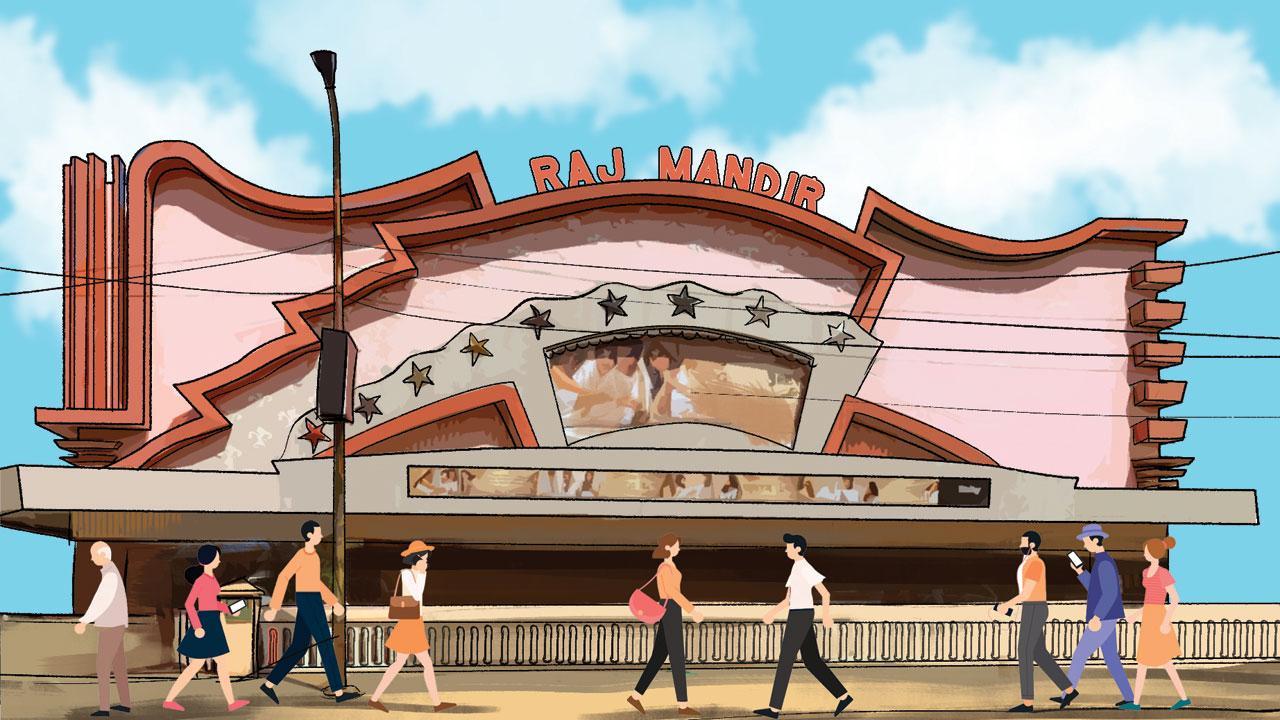It reached me as an idea that the old form was alive in Bollywood, and that we brought to the [fore]ground in Romeo+Juliet and Moulin Rouge

Illustration/Uday Mohite
![]() Australian director Baz Luhrmann (Moulin Rouge, Romeo + Juliet), well-known Indophile, was absolutely smitten by the jaw-dropping Raj Mandir Cinema in Jaipur, as well as its audience, I read somewhere long ago. If memory serves right, he said something like this: “It is an ice cream palace of a cinema. All the audience was thoroughly engaged with the film—they were talking, laughing, clapping, singing, whistling, talking on their mobile phones… It was a seminal moment in my understanding of cinema. I tried to recreate that interactivity with film in my Moulin Rouge.” I was gobsmacked to read this.
Australian director Baz Luhrmann (Moulin Rouge, Romeo + Juliet), well-known Indophile, was absolutely smitten by the jaw-dropping Raj Mandir Cinema in Jaipur, as well as its audience, I read somewhere long ago. If memory serves right, he said something like this: “It is an ice cream palace of a cinema. All the audience was thoroughly engaged with the film—they were talking, laughing, clapping, singing, whistling, talking on their mobile phones… It was a seminal moment in my understanding of cinema. I tried to recreate that interactivity with film in my Moulin Rouge.” I was gobsmacked to read this.
ADVERTISEMENT
“Indian musicals have inspired me since the first time I’ve been here,” Luhrmann told the Hindustan Times in 2010. “I had that cathartic experience 15 years ago, when I was here working on Shakespeare and watching a Bollywood movie, and it felt the same… [In Bollywood films] there’s tragedy, then comedy and next is music, which is just like Shakespeare’s works. It reached me as an idea that the old form was alive in Bollywood, and that we brought to the [fore]ground in Romeo+Juliet and Moulin Rouge.”
I was recalling all this as I saw Shah Rukh Khan’s Pathaan at the Raj Mandir Cinema in Jaipur last fortnight (1,132 seats according to bookmyshow!). It was hard to focus on the film when there was so much going on in the architecture and interior design inside the auditorium—as well as with the audience—while we were watching the film. According to cinematreaures.org and the cinema’s Facebook page, Raj Mandir was designed by WM Namjoshi, in the Art Moderne architectural style, a more streamlined, American version of Art Deco, in the 1930s. In the foyer are classy chandeliers, fountain motifs, haveli arches, sweeping and swooping lines everywhere, with a dramatic ramp—not stairs—leading to the balcony. Yeah, and it opened in 1976 with Charas, starring Dharmendra and Hema Malini. I haven’t seen any cinema like it in the world. It comes close to the Royal Theater Tuschinski film theatre in Amsterdam, in Art Deco style, but holds its own.
Also Read: Some stuff this week
Inside the auditorium, the interior decoration was full of swooshing icing fronds and curves, with intermittently changing concealed lighting—red, violet, green, blue… with red velvet, ruched screen curtains. And the audience went crazy over Pathaan—they were talking, laughing, clapping, whistling… there was a wave of phones, with people chatting with loved ones on video calls, so they could also participate in the mayhem. Normally I’m allergic to bak-bak during a film screening, but here somehow, it didn’t seem disrespectful, but another cinema ritual for the masses.
I went to Pathaan with four friends—Priti Turakhia, Shruthi Veena Vishwanath, Pankti Shah Gala and her daughter Vaani, three, and I felt privileged to be at Vaani’s first film initiation in a proper single screen movie theatre, with Pathaan. She took the action, maar-dhaad and bikinis pretty well—her mum sensibly covered her eyes for much of the film, though. Surely Indians deserve a nice ritual for the baby’s first film in a theatre? The Bengalis have “annaprashan” (accepting food), an elaborate ritual, as the clan assembles to celebrate the wonder of a bebe eating its first solid food, with a morsel of rice.
Malayalees celebrate vidyarambham (beginning of knowledge), with elders holding the hands of small children and helping them write their first alphabets in a plate of rice grains (I love the panache of combining knowledge with prosperity in a single metaphorical flourish—wooh!). So we celebrated Vaani’s “filmprashan” by treating her and ourselves to pyaaz kachori (a Jaipur speciality, a friend pastry with spicy onion filling) and Pepsi. When I was about her age, my parents took my sister Sarayu and me to Regal cinema for Sound of Music, Mary Poppins, My Fair Lady, et al, and in the interval we slurped ‘Softee’ ice cream in cones—it was all the rage then. Write and tell me what you hogged at your filmprashan.
Meenakshi Shedde is India and South Asia Delegate to the Berlin International Film Festival, National Award-winning critic, curator to festivals worldwide and journalist.
Reach her at meenakshi.shedde@mid-day.com
 Subscribe today by clicking the link and stay updated with the latest news!" Click here!
Subscribe today by clicking the link and stay updated with the latest news!" Click here!







